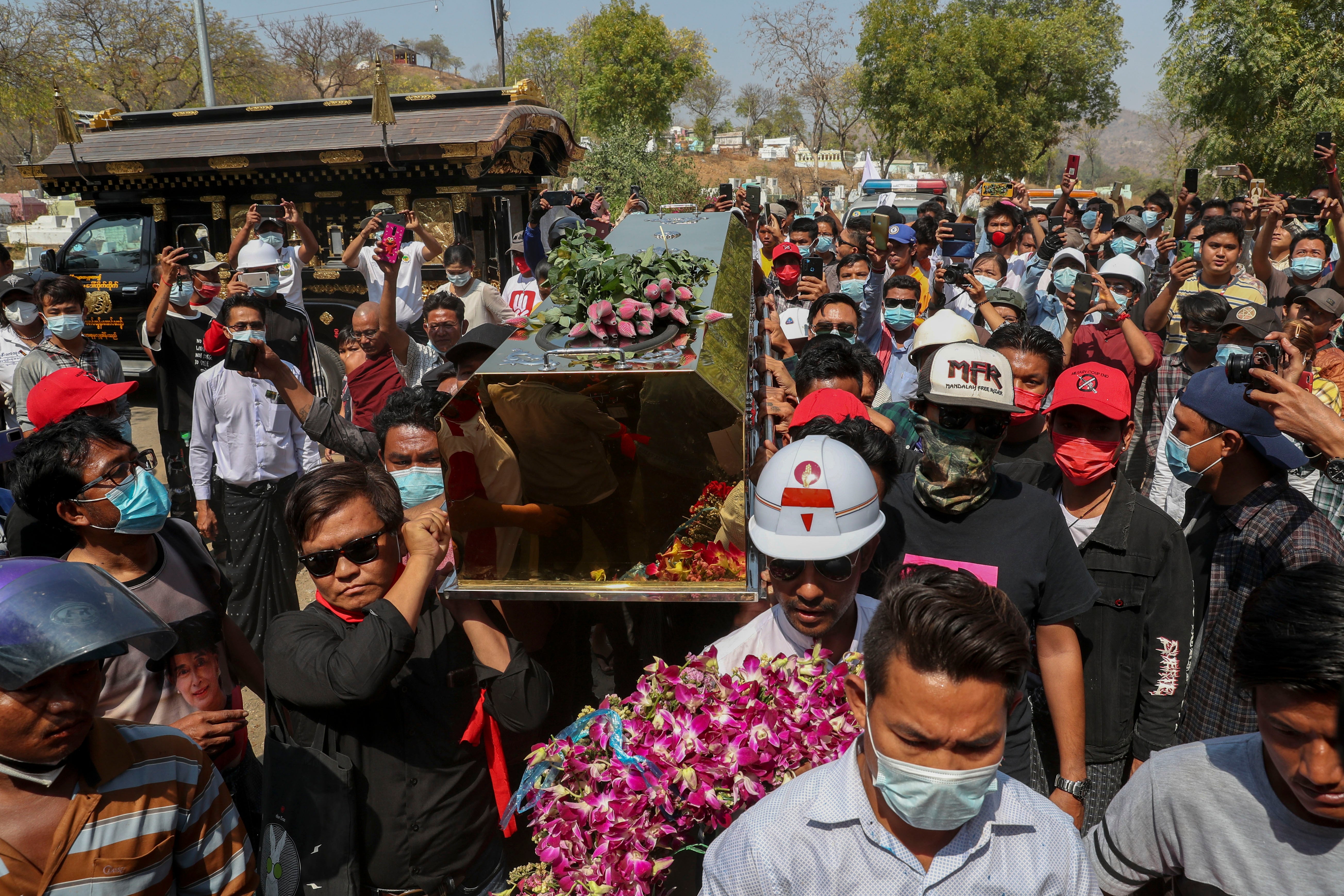Myanmar protesters write emergency details on arms: ‘I love you mom’
Fears triggered by warnings from the military, perceived as a threat by some protesters, that continued demonstrations could result in ‘loss of life’

Your support helps us to tell the story
From reproductive rights to climate change to Big Tech, The Independent is on the ground when the story is developing. Whether it's investigating the financials of Elon Musk's pro-Trump PAC or producing our latest documentary, 'The A Word', which shines a light on the American women fighting for reproductive rights, we know how important it is to parse out the facts from the messaging.
At such a critical moment in US history, we need reporters on the ground. Your donation allows us to keep sending journalists to speak to both sides of the story.
The Independent is trusted by Americans across the entire political spectrum. And unlike many other quality news outlets, we choose not to lock Americans out of our reporting and analysis with paywalls. We believe quality journalism should be available to everyone, paid for by those who can afford it.
Your support makes all the difference.Protesters in Myanmar have taken to scrawling emotional last messages to their families, emergency contact details and their blood group on their arms to be used in case they are killed during demonstrations, after the military junta issued chilling warnings about the use of deadly force.
Numbers are swelling at a general strike called against the military regime that took over in a coup on 1 February, despite warnings from the authorities that the continued presence of demonstrators could lead to “loss of life”.
Images shared to social media on Monday and Tuesday showed arms scribbled with messages like “love you mom” in marker pen, as well as important information to be used in the event of serious injury or death.
Three people have been killed in the protests so far and hundreds injured, as the police have used a range of tactics from water cannon and tear gas to live fire in a bid to disperse the protesters. At least 684 people have been detained since the coup, according to a monitoring group.
Demonstrators are calling for the restoration of the democratically elected government of Aung San Suu Kyi and her National League for Democracy (NLD) party. Ms Suu Kyi and other civilian leaders were rounded up and have been held under house arrest since the coup.
On Sunday the army issued a warning in a broadcast on the state-run MRTV news channel, saying protesters will suffer “loss of life” if they continued to demonstrate. It warned people of "riot and anarchy" and said protesters were "now inciting the people, especially emotional teenagers and youths, to a confrontation path where they will suffer the loss of life".
Many defied the warning on Monday, with tens of thousands packing the streets of major cities Yangon, Mandalay, and Naypyidaw as well as smaller towns and rural areas. Monday’s mass demonstrations were dubbed the “22222” general strike, in the reference to the date 22.2.2021.
It was in line with pro-democracy demonstrations against military rule that were held on 8 August 1988 – or 8.8.88 – when brutal clashes erupted between security forces and people. Hundreds of anti-government protests were killed at that time.
On Tuesday, people hit the streets again but the numbers were down from Monday’s massive protest. Around 1,000 assembled in Yangon till morning to take out protests in other areas.
Businesses and government offices have been suffering as people from all sectors, including health, banking and law took part in the civil disobedience movement.
The junta has been attempting to stop the protests by imposing curfews and ban on the gathering of five or more people while disconnecting the internet during the nights. Late night raids are being conducted at the houses of young activists to detain them.
The foreign ministers from the G7 nations and UN Children’s Fund (UNICEF) called out the military-run government of Myanmar on Tuesday over its actions against protesters.
Dominic Raab, the foreign secretary of the UK which currently holds the presidency of the G7 - and his counterparts from the US, France and Germany issued a joint statement warning that violence towards protesters “must be held to account”.
“Use of live ammunition against unarmed people is unacceptable. Anyone responding to peaceful protests with violence must be held to account,” read the joint statement. "We condemn the intimidation and oppression of those opposing the coup.”
Unicef said it was gravely concerned by the reports of the use of lethal force against protesters and also raised the issue with the “loss of life” warning issued by the military.
"Unicef calls on security forces to refrain from violence, to exercise maximum restraint and for differences to be resolved through constructive and peaceful means, prioritising the protection and safety of children and young people," it said.




Join our commenting forum
Join thought-provoking conversations, follow other Independent readers and see their replies
Comments